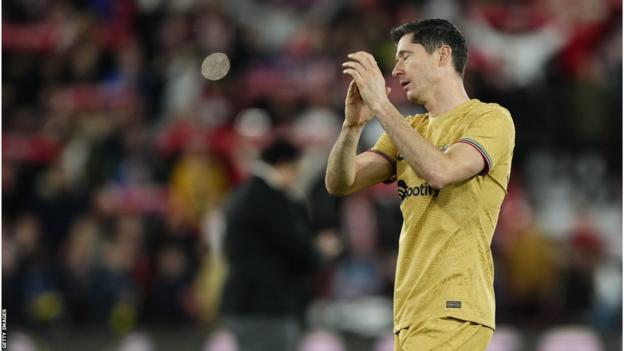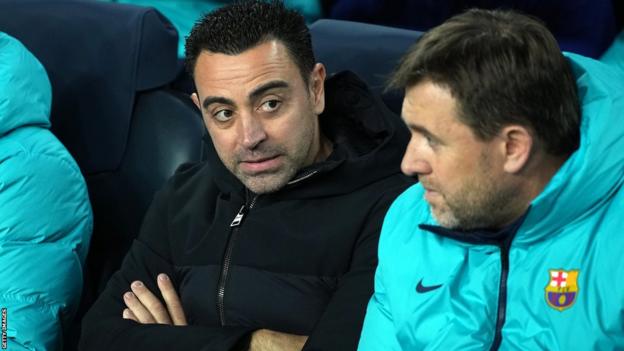[ad_1]

Barcelona are sitting pretty at the top of La Liga, holding a seven-point lead over Real Madrid after just two league defeats, and have already claimed the first silverware of the season by convincingly beating their arch-rivals 3-1 in January’s Super Cup.
Heading into Thursday’s Copa del Rey semi-final first leg against Real at the Bernabeu, those contradictions neatly summarise Barca’s current state: plenty of promise, but worrying signs that everything could quickly unravel.
Similarly, the delicate balance between positives and negatives reflects the work of manager Xavi, who is being forced to make tactical compromises to satisfy short-term demands for success.
Xavi, without doubt, has made Barca better since he was appointed in November 2021.
He inherited a mess, with a lack of direction on the field and the aftermath of a financial disaster behind the scenes.
Memories of embarrassing European defeats were particularly acute: the infamous collapse at Liverpool in 2019; a humiliating 8-2 thrashing against Bayern Munich the following year; a 4-1 home loss to Paris St-Germain in 2021. When Xavi took over, it felt like Barca were a very long way from being able to challenge the best.
Now, though, the picture has changed. Although Xavi has failed to embark upon an extended European journey, at least they competed. Barca were unlucky to suffer elimination from a tough Champions League group alongside Bayern and Inter Milan, and pushed Manchester United hard in the Europa League play-off.
In La Liga, a commanding run of 12 wins in 13 games has provided a strong platform for the club to claim their first league title in four years, mainly thanks to a greatly improved defence with just eight goals conceded in the opening 23 games.
That new-found defensive strength has been particularly important in recent weeks, because goals have dried up.
Robert Lewandowski – so impressive earlier in the season – has returned from the World Cup looking every day of his 34 years and is now injured, joining electric but erratic winger Ousmane Dembele in the treatment room.
Elsewhere in the forward line, Ferran Torres has been largely disappointing since signing from Manchester City last January, former Leeds star Raphinha has been hit and miss, and Ansu Fati’s teenage promise has been alarmingly derailed by injuries.
Barca have scored more than once in just three of their last nine league games, instead relying on a series of clean sheets to pick up points.
Xavi deserves credit for recognising the team to become more compact and defensively disciplined, something he has achieved by reluctantly moving away from his preferred methods.
A devout disciple of the Johan Cruyff-inspired ‘juego de posicion’ (positional play) that has been Barca’s trademark for decades, Xavi took over with clear tactical intentions after serving a three-year managerial apprenticeship with Al Sadd in Qatar.
His team would push high, playing in the opposition half as much as possible. Advanced wingers would hug the touchline to open up space for the midfielders to link up with the target man, using strict positional discipline throughout the team to generate numerical superiorities.
That was the theory, but turning it into reality has been difficult due to fundamental gaps in the squad.

Firstly, Xavi possesses no left wingers. The season began with Dembele and Raphinha both starting and regularly switching flanks, but that did not work because neither was comfortable holding width on the left, and they have only started two league games together since October.
The squad also lacks a natural right-back, with Hector Bellerin signed for that purpose but never convincing Xavi and joining Sporting Lisbon in January.
That leaves Sergi Roberto – who Xavi prefers in midfield – and Jules Kounde, who arrived in the summer from Sevilla as a prized central defender but has mostly been repositioned on the right, for the simple reason nobody else can play there.
The result has been a strangely asymmetric line-up, with left-back Alex Balde (or Jordi Alba) pushing forward to provide width, a compact ‘box’ midfield of two deeper protectors (Sergio Busquets and Frenkie de Jong) behind two more advanced playmakers (Gavi and Pedri), while the right winger (Dembele) delivers ammunition to the centre forward (Lewandowski).
That messy approach, driven by compromise, never looked pretty. But, for a while, it worked – albeit mainly through solid defending and moments of individual inspiration rather than the aggressive tactical dominance Xavi would prefer to achieve.
Recently, though, the wheels have fallen off. Pedri, Dembele and Lewandowski – the team’s three most important attacking players – are all injured, others are looking tired, understudies such as Torres, Raphinha, Sergi Roberto and Franck Kessie have struggled, while uncertainty appears to have started to spread through an increasingly error-prone defence.
Two away defeats in four days – at Manchester United and Almeria – have undermined confidence, ensuring a nervous approach to a trio of Clasicos in a month, with the two-legged cup semi-final (2 March and 5 April) sandwiching a league meeting on 19 March.
Playing in front of their fans, Real will be highly motivated for Thursday’s first leg – especially with fresh memories of a poor performance in January’s Super Cup loss to Barca.
As Liverpool experienced last week, when Carlo Ancelotti’s team hit their stride they can overwhelm any opponent, and right now Xavi’s Barcelona look more fragile than any other stage this season.
If Real can deliver a similar outcome this week, alarm bells will start ringing in Catalonia.


By Andy West
Source link




